Introduction #
Dune: Imperium is a game of tense decisions, cold calculations, and lots and lots of spice. Whether you’re politicking in the shadows or waging all-out war on Arrakis, this game manages to capture the epic feel of the Dune universe in all its strategic glory. So, strap in–let’s dive into the dust storm that is Dune: Imperium.
Overview #
In Dune: Imperium, you step into the shoes of a leader of one of the Great Houses, competing for dominance on the desert planet of Arrakis. If that sentence alone doesn’t make you feel powerful, I’m not sure what will. The game is a hybrid of deck-building and worker placement, meaning you’re constantly torn between focusing on building your deck, placing your agents, and vying for control of the spice–the most valuable resource in the universe.
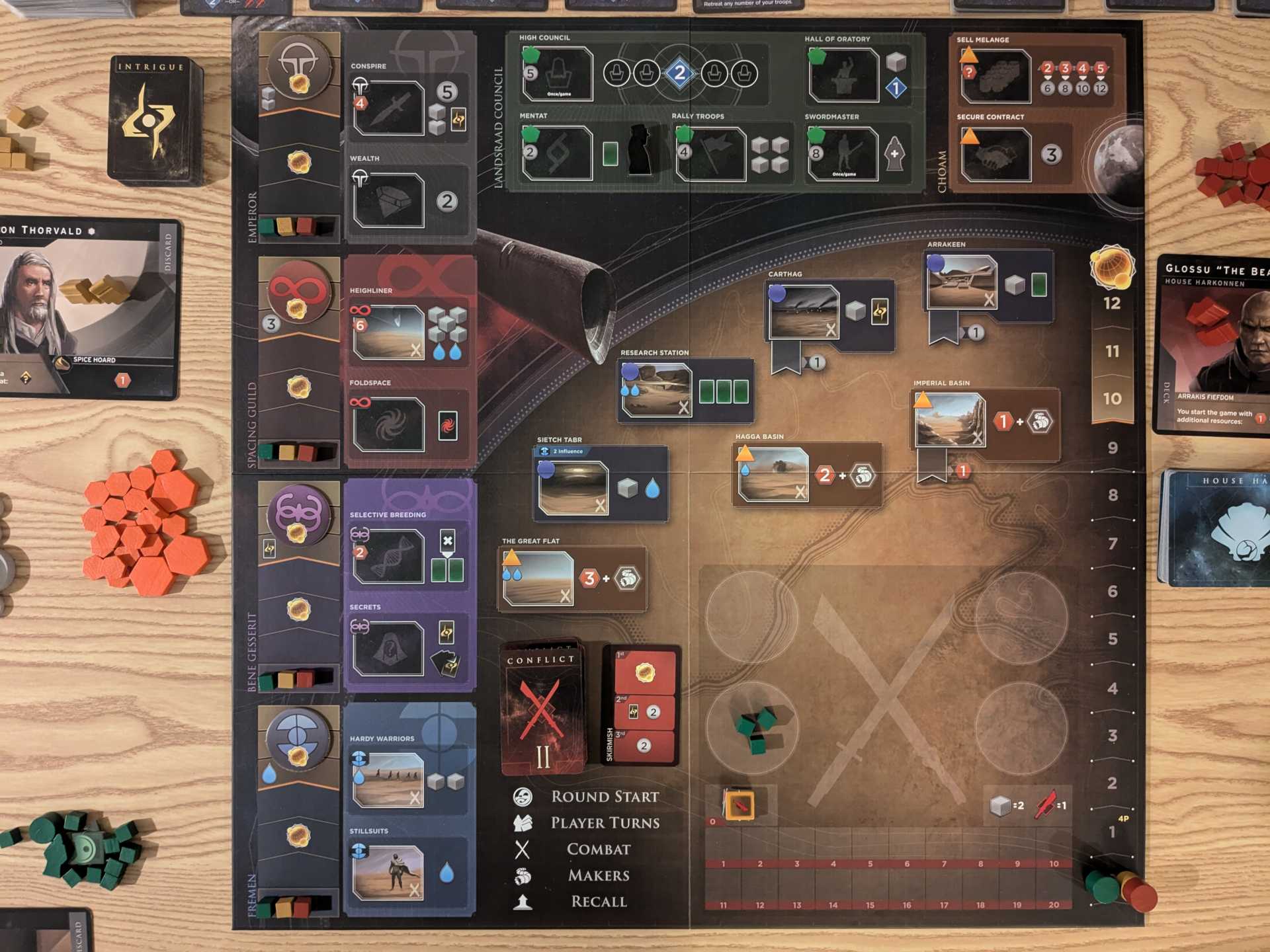
The basic premise is that you send your agents to various locations on the board to take actions, using cards from your hand to dictate where they can go. The ultimate goal is to reach 10 victory points before your opponents, which you can earn through alliances with powerful factions, combat victories, or gaining control over the spice trade. But there’s a catch–this is Dune, after all–so nothing comes easy. There’s a constant push-and-pull between what you want to do and what you can do.
Gameplay #
The first thing that struck me about Dune: Imperium is how delightfully agonizing it is to make decisions. You’ll constantly find yourself torn between too many good options and never enough resources to execute them all. You’re often forced to weigh the many good options to tease out the better option which feels empowering rather than limiting.
One of the unique elements is the worker placement mechanic combined with deck-building. You’re not just sending agents to spaces on the board–you’re also using cards from your hand to dictate where those agents can go. This adds a layer of tension. Will you use a great card to place your worker on that crucial spot or leverage its agent ability? Or will you save it for its combat ability or to buy new cards later in the round? The constant balancing act keeps things interesting, and nothing feels worse than realizing you don’t have the right card to send your agent to the place you need, but you know it’s your own fault for not deck-building better.

And then, there’s the combat. In Dune: Imperium, combat takes place at the end of each round and it’s intense. I love how the game ramps up over time, with the final rounds often culminating in dramatic clashes that feel fitting for a battle on Arrakis. Deciding when to commit your troops and when to hold them back is key. Garrisoning your forces, keeping them in reserve for the “right” battle, creates delicious tension as you wait to unleash your army at just the right moment.
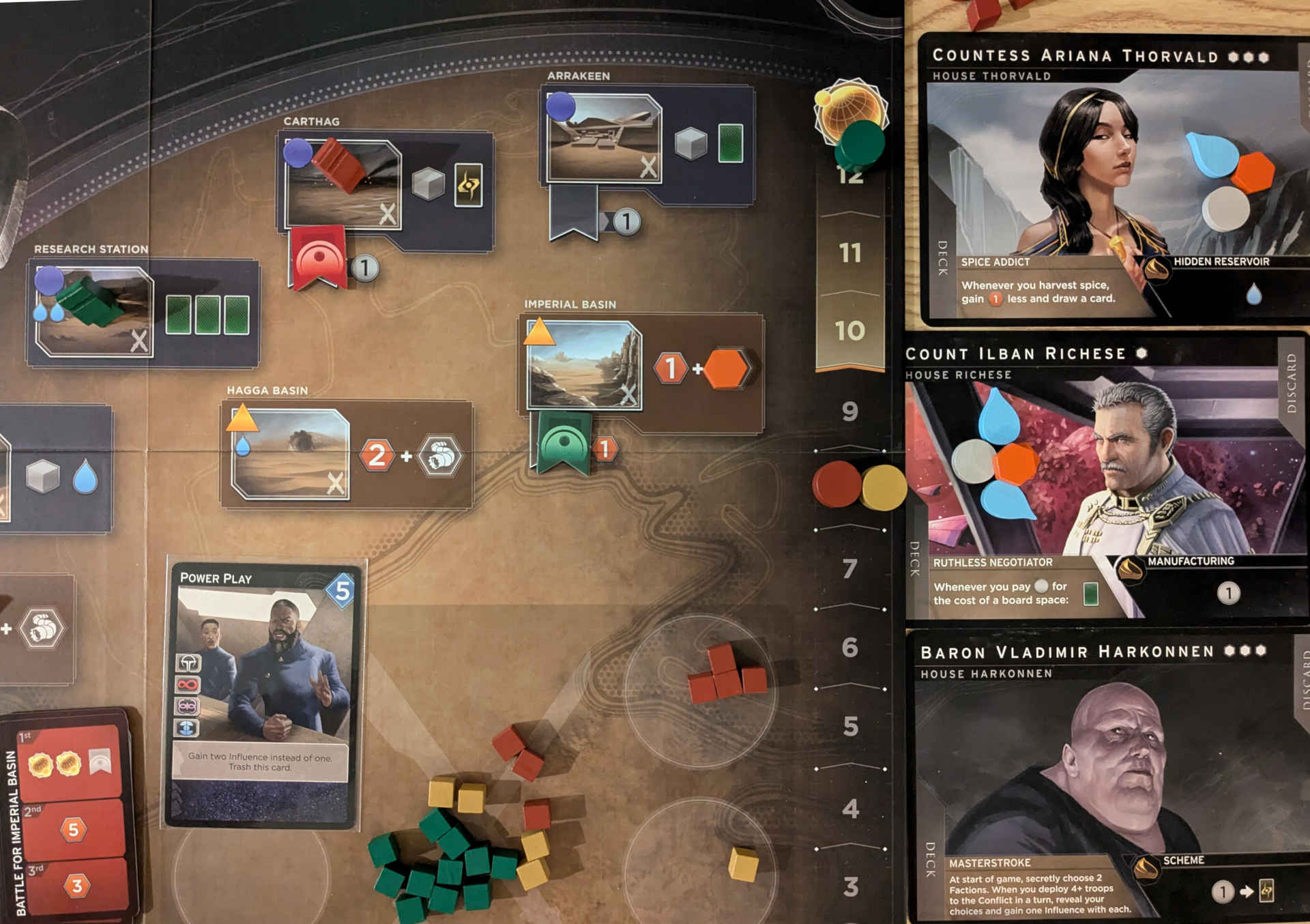
Going last in turn order often felt like a secret advantage. Not only did I get to see where everyone else was placing their workers, but I could also decide whether or not it was worth diving into combat. Do I commit? Do I watch the others battle it out while I bide my time? The choice is mine–and it’s this flexibility that makes each game so dynamic.
But let’s talk about the pain of decision-making again because it’s what really defines the experience. One of the toughest moments comes when you’re staring at a hand full of fantastic cards and realizing you can only use one or two of them for their agent abilities. The rest have to be discarded and their agent abilities–however good–will not come back around for a while. This creates a sense of loss that can either be frustrating or thrilling, depending on your mindset.
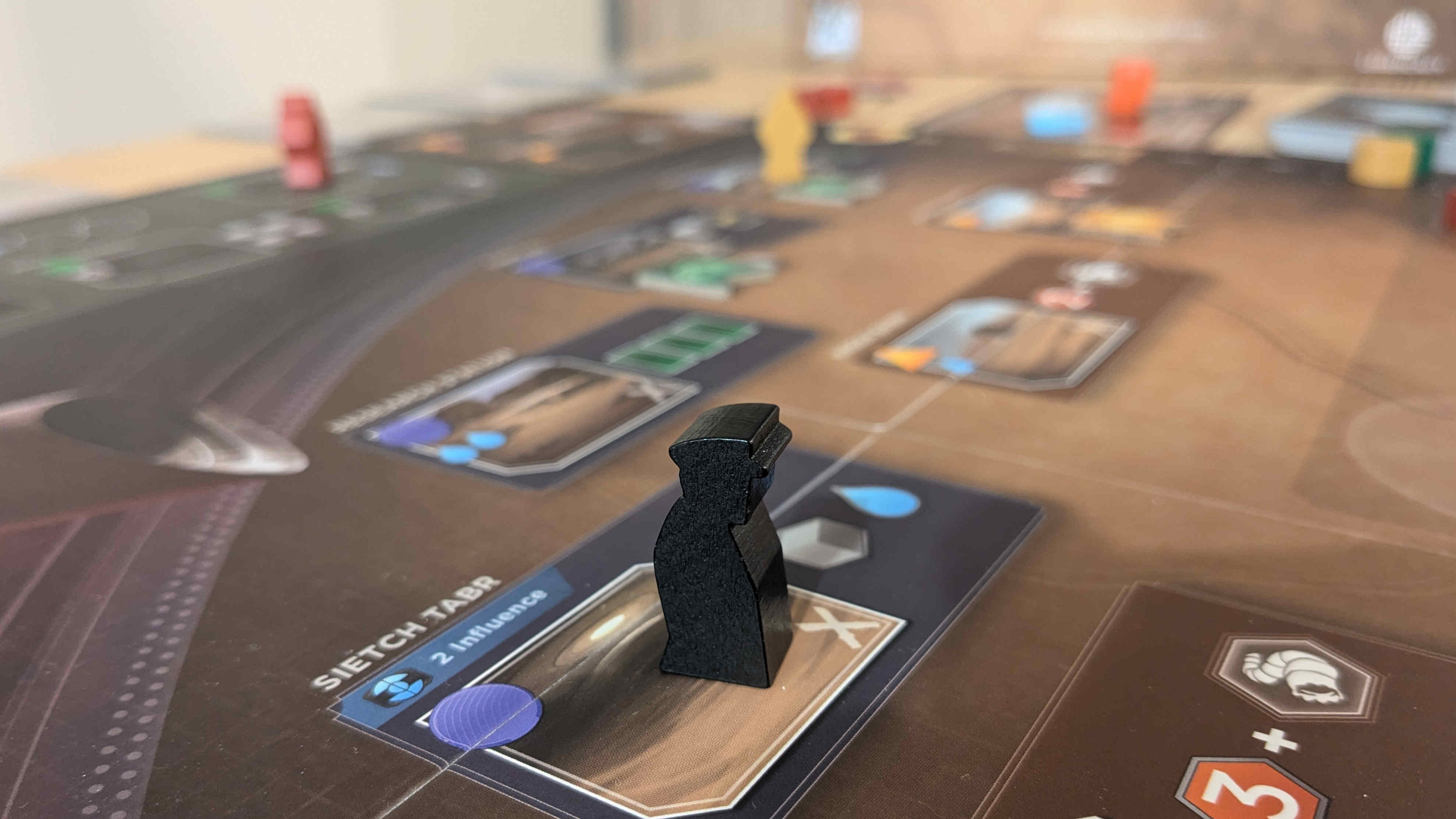
Deck-building also plays a crucial role in shaping your strategy. Your deck not only powers your ability to place agents, but it also dictates how you fare in combat and how you build long-term political alliances. The stakes get higher as the game progresses, and with each new card, you’re investing in future rounds. Nothing stings more than realizing your deck isn’t quite ready for that crucial end-game push. Or worse, planning out the perfect worker placement only to discover you don’t have the cards to pull it off. Ouch.
Solo Play #
Playing Dune: Imperium solo adds an interesting twist. You’ll play against two AI players, and while you’re not directly interacting with them as you would with human players, they can still mess up your plans in the most satisfying (and frustrating) way possible. There’s a bit of a “crab bucket” feeling when the AIs start vying for dominance. You’re not necessarily rooting for either of them, but sometimes you’ll find yourself hoping the weaker AI comes out on top just to prevent the stronger one from steamrolling to victory. It adds a layer of strategic depth that makes solo play feel more competitive than if it had been designed against a single AI opponent.
The AI deck is also surprisingly clever. By counting the cards that have already been revealed, you can start to predict where the AI might move next. It’s like reading the mind of a rival player, and it gives the solo mode an edge that many other solo board games lack.
Components and Design #
Let’s talk components. Dune: Imperium doesn’t come with flashy miniatures or overly intricate designs. The components are simple: wooden tokens for your workers and cubes for your troops. But that’s part of its charm. The real visual beauty comes from the cards and the game board, both of which are designed with a stunning aesthetic. The character art feels like concept art from the most recent Dune movies which is a relief because the could have cheaped out by using still frames from the films. It’s a step up, giving the game a distinct style that feels immersive while still leveraging the recognizable likeness of the actors.
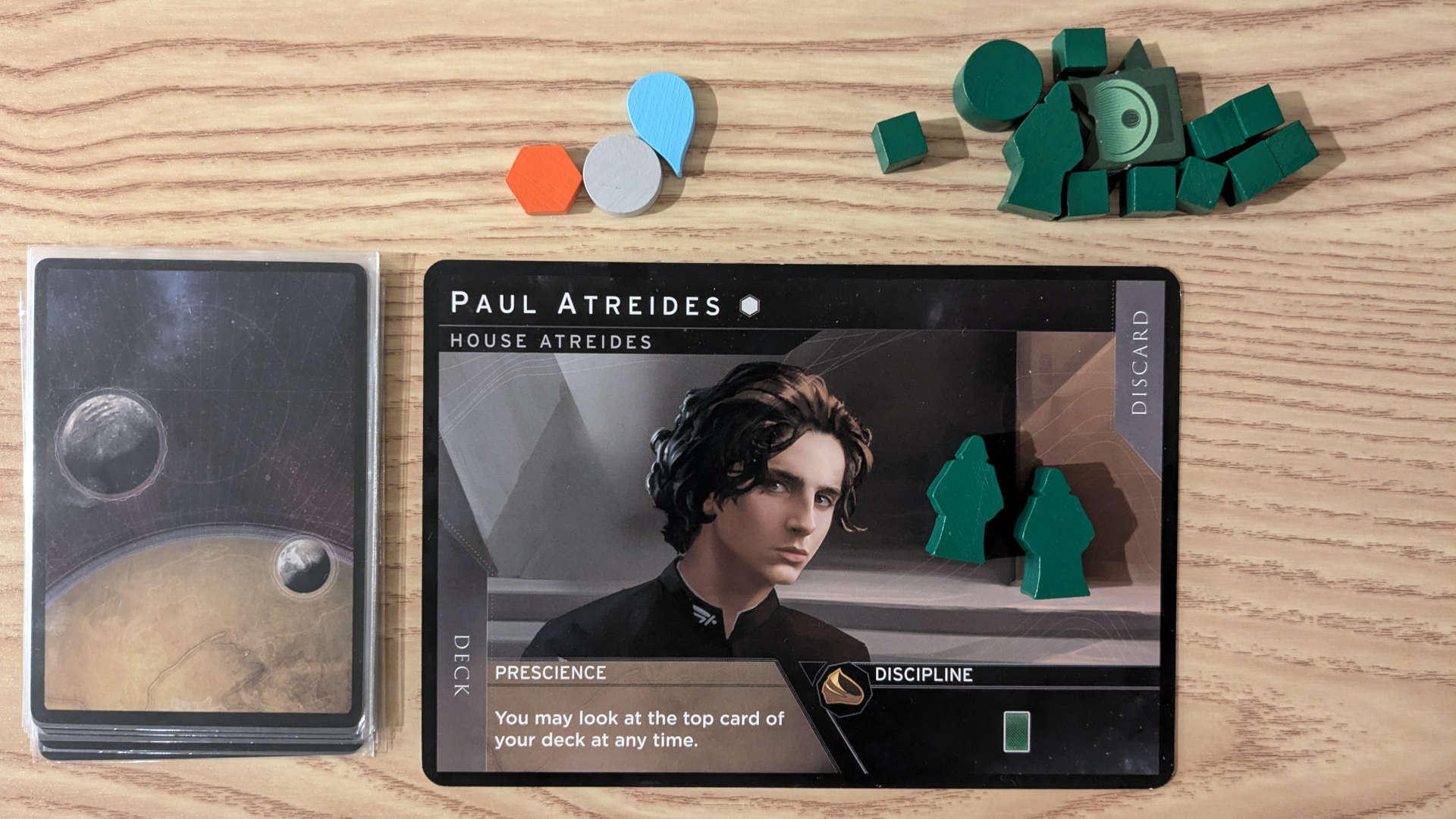
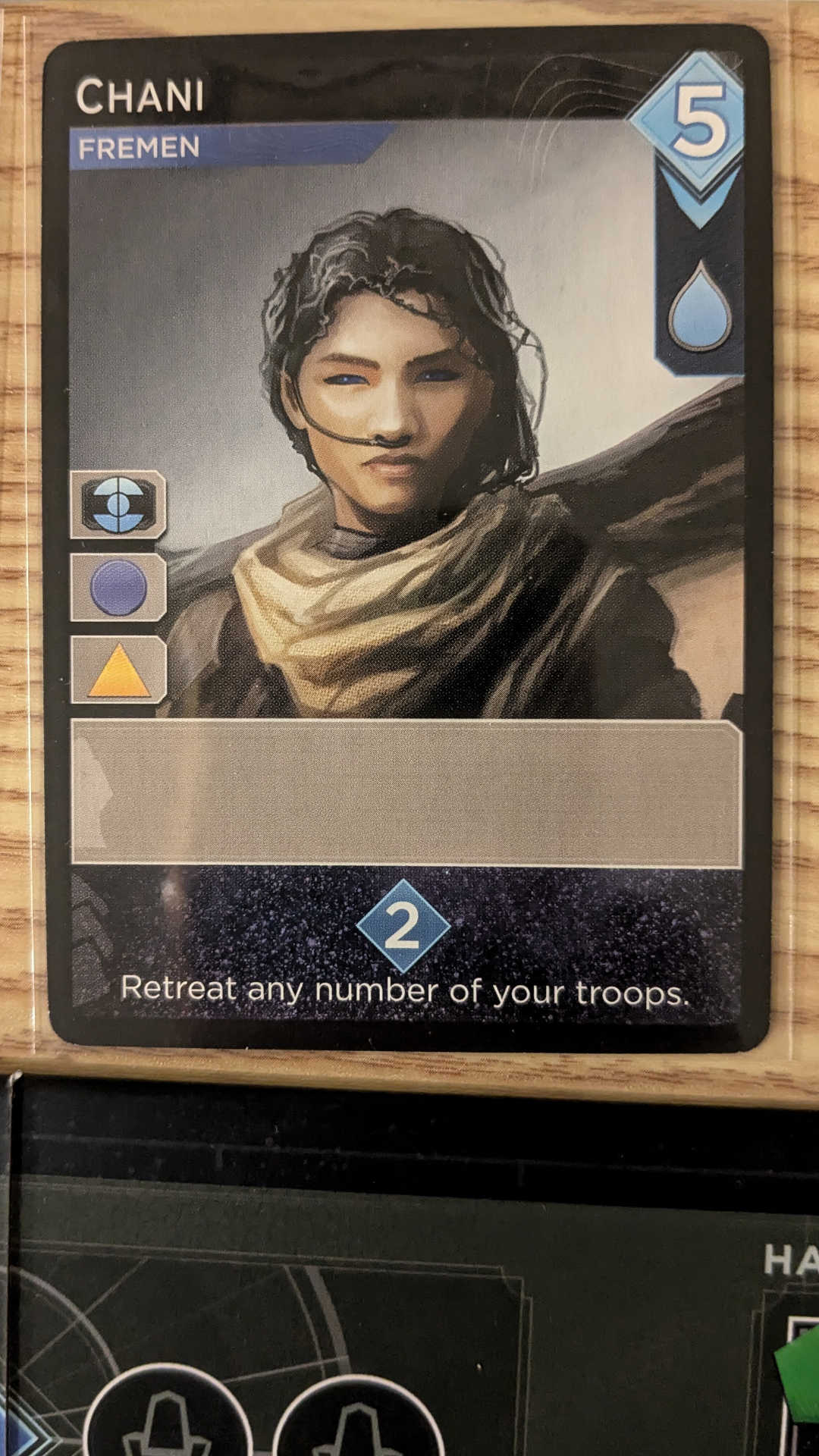
The thematic elements really pull you into the world of Dune. You’re not just moving pieces around; you’re a House Lord, sending your agents into the political arena, deploying troops to secure vital resources, and leveraging the power of cards that feel like they were ripped straight from the pages of Frank Herbert’s novel. The theme isn’t just a veneer here–it’s deeply ingrained in the mechanics, making every decision feel thematic. Whether it’s strategizing against Baron Harkonnen or using your Bene Gesserit powers to manipulate the political game, Dune: Imperium makes you feel like you’re in the thick of things.
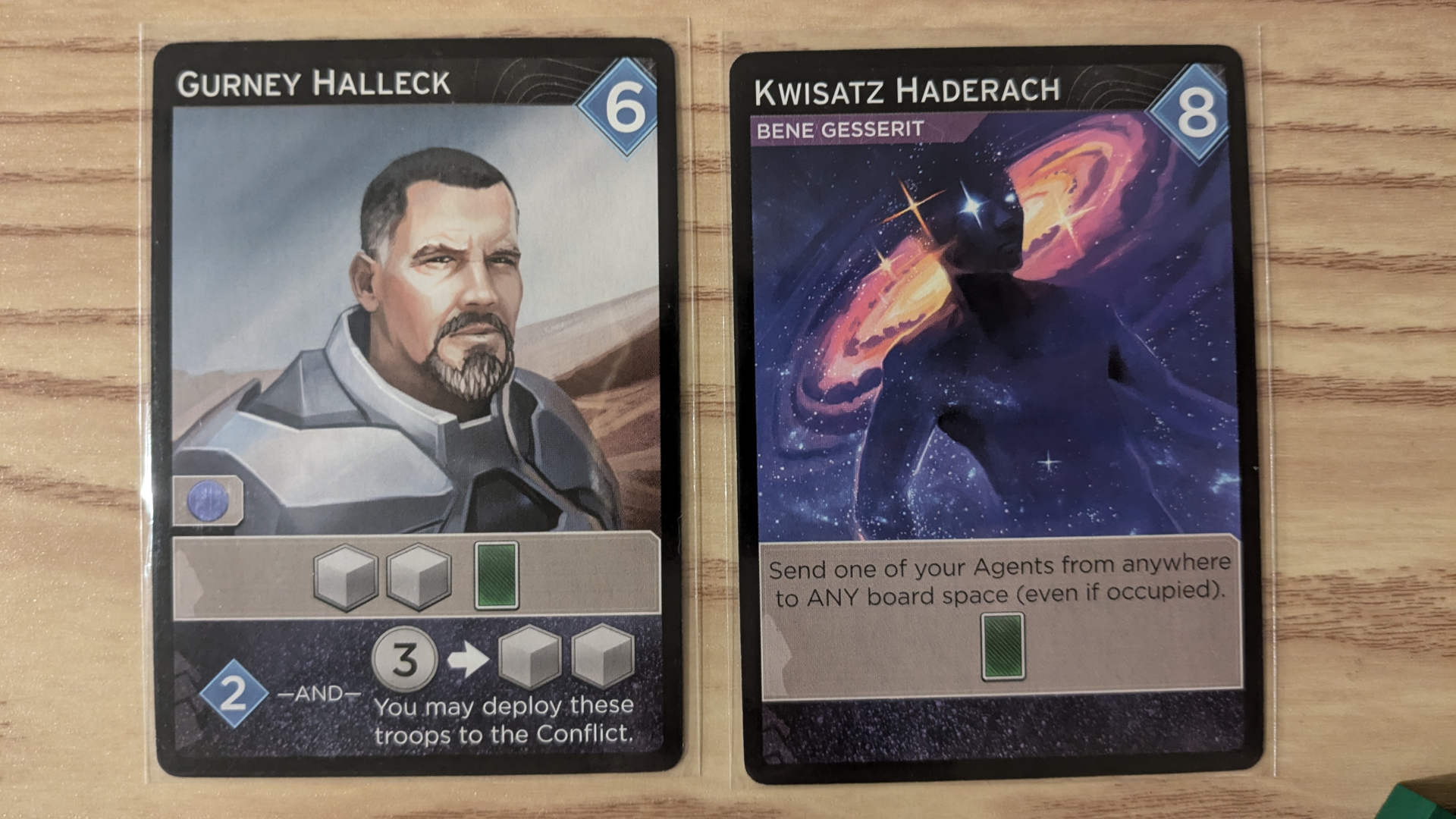
Final Thoughts #
At the end of the day, Dune: Imperium is one of those games that keeps you coming back for more. The blend of worker placement and deck-building is unique and rewarding, offering tough choices at every turn. The solo mode stands strong, giving you the thrill of competition even when you’re playing by yourself. And the theme? Absolutely nailed it. Whether you’re a fan of Dune or just a lover of strategy games, this one is a must-play. Prepare for battles, both on the board and in your mind–because Dune: Imperium doesn’t just challenge your strategy, it challenges your will to dominate.
We purchased this product independently. All opinions expressed are independent, honest, and unbiased.
- The combination of deck-building and worker placement keeps the gameplay fresh and full of tough, interesting decisions.
- The Dune universe is well-integrated into the gameplay, with mechanics that align beautifully with the theme, making you feel like you're really in the world of Arrakis
- The AI provides a solid challenge, and counting the AI's deck adds a layer of strategy that many solo games lack.
- The game builds up to intense final rounds where every move and decision counts, creating memorable moments.
- While functional, the components aren’t flashy or overly produced. Wooden tokens might feel underwhelming for some.
Learn more about how we rate board games...
